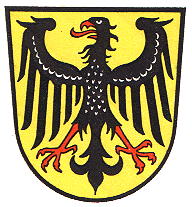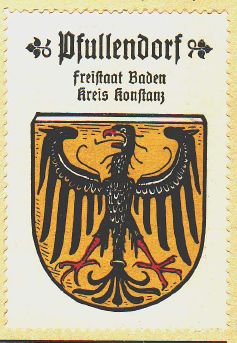Pfullendorf: Difference between revisions
Knorrepoes (talk | contribs) No edit summary |
Knorrepoes (talk | contribs) No edit summary |
||
| Line 9: | Line 9: | ||
State : [[Baden-Württemberg]]<br/> | State : [[Baden-Württemberg]]<br/> | ||
District (Kreis) : [[Sigmaringen (kreis)|Sigmaringen]] (until 1972 [[Überlingen (kreis)|Überlingen]])<br/> | District (Kreis) : [[Sigmaringen (kreis)|Sigmaringen]] (until 1972 [[Überlingen (kreis)|Überlingen]])<br/> | ||
Additions : | Additions : 1972 [[Otterswang]]; 1973 [[Denkingen (Pfullendorf)|Denkingen]], [[Großstadelhofen]], [[Mottschiess]], [[Zell am Andelsbach]]; 1975 [[Aach-Linz]], [[Gaisweiler]] | ||
[[File:pfullend.jpg|center]] | [[File:pfullend.jpg|center]] | ||
Revision as of 07:41, 26 April 2014
| Heraldry of the World Civic heraldry of Germany - Deutsche Wappen (Gemeindewappen/Kreiswappen) |
PFULLENDORF
State : Baden-Württemberg
District (Kreis) : Sigmaringen (until 1972 Überlingen)
Additions : 1972 Otterswang; 1973 Denkingen, Großstadelhofen, Mottschiess, Zell am Andelsbach; 1975 Aach-Linz, Gaisweiler
Official blazon
In Gold ein rot bewehrter und rot bezungter schwarzer Adler.
Origin/meaning
Pfullendorf uses the Imperial eagle as its arms, already since the 13th century. Pfullendorf was granted city rights in 1220 by Emperor Friedrich II. Before 1220 it was owned by the Lords of Pfullenberg and later the Dukes of Staufen. From 1270-1802 the city was a free Imperial city and from 1803 onwards it was part of Baden.
As an Imperial city, Pfullendorf had the right to use the Imperial eagle. Unlike many other cities, the eagle remained the one-headed variety, even after the Emperors used the double-headed eagle. Similarly, Pfullendorf never added an escutcheon with some local symbol (see Aalen as an example).
| The arms in the Kaffee Hag albums +/- 1925 |
Literature : Stadler, K. : Deutsche Wappen - Bundesrepublik Deutschland. Angelsachsen Verlag, 1964-1971, 8 volumes.


